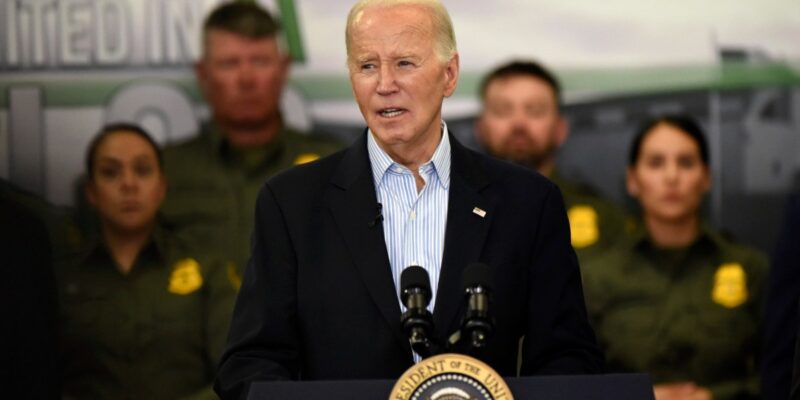
On Tuesday, the Biden administration issued a new sweeping executive order further limiting access to asylum at the US-Mexico border. The long-anticipated move, which relies on an authority previously invoked by the Trump administration to restrict immigration, will allow border officials to temporarily suspend asylum processing between official ports of entry and swiftly return migrants to neighboring Mexico and countries of origin at times when crossings rise to a certain threshold. The directive, which mirrors a now-defunct Senate border deal, is set to go into effect on Tuesday at midnight.
“President Biden believes we must secure our border,” a White House statement reads. “That is why today, he announced executive actions to bar migrants who cross our Southern border unlawfully from receiving asylum. These actions will be in effect when high levels of encounters at the Southern Border exceed our ability to deliver timely consequences, as is the case today.”
This latest and likely most drastic crackdown on asylum by a Democratic president in recent years comes at a time when migrant encounters at the southern border are in decline after record-breaking levels of migration. The move consolidates President Biden’s marked rightward shift on immigration and signals how far the administration is willing to go to rebut Republicans and Donald Trump’s “open borders” accusations. Critics and advocates say that, in trying to come on top of a sticky electoral issue ahead of the November vote, Biden might just end up outdoing his opponent’s hardline record by gutting access to asylum.
“It’s notable to see the White House prep a POTUS event on policies that Dems used to call illegal,” Andrea R. Flores, who once served as director for border management on Biden’s National Security Council, wrote on X, formerly known as Twitter, prior to the announcement. “Pundits will say this is a smart move to the center on immigration, but this issue has moved so far to the right that Dems are embracing extreme asylum bans even when border numbers are down.”
Biden might end up outdoing even Trump’s hardline policies on asylum.
The executive order is based on section 212(f) of the Immigration and Nationality Act which allows the president to suspend the entry of foreigners if “detrimental to the interests” of the United States. The directive places a cap on the processing of asylum claims and migrants that would be triggered once unlawful border crossings reach an average of 2,500 per day over a week. The partial ban would only be lifted 14 days after the weekly average of daily encounters fall to 1,500.
Last month, Customs and Border Protection (CBP) recorded a daily average of 3,700 encounters between ports of entry—a significant decrease from the 8,000 registered in December, but still high enough to set off the border closure. The executive order, which includes exemptions for unaccompanied minors and migrants fleeing imminent harm, is likely to prompt legal challenges—and potential court orders blocking the effort—similar to the ones the Trump administration faced.
BREAKING: The Biden administration just announced an executive order that will severely restrict people’s legal right to seek asylum, putting tens of thousands of lives at risk.
This action takes the same approach as the Trump administration’s asylum ban. We will be challenging…
— ACLU (@ACLU) June 4, 2024
In a 10-minute announcement, Biden blamed Republicans for not taking congressional action to secure the border. “Frankly, I’d have preferred to address this issue through bipartisan legislation,” he said, adding that “Republicans left me no choice.”
The president also tried to distance himself from the Trump administration. “I will never demonize immigrants,” he said. “I’ll never refer to immigrants as poisoning the blood of a country. And further, I’ll never separate children from their families at the border. I will not ban people from this country because of their religious beliefs. I will not use the US military to go into neighborhoods all across the country, to pull millions of people out of their homes and away from their families, to put detention camps while we’re waiting deportation, as my predecessor says he will do if he occupies this office again.”
The timing of the policy move follows the results of the presidential elections in Mexico that saw Claudia Sheinbaum, a protege of outgoing leader Andrés Manuel López Obrador, elected the country’s first woman president. The recent drop in migrant crossings into the United States is due in no small part to the Mexican government’s increased clampdown on migration. The return of migrants and asylum seekers per the executive order would inevitably require Mexico’s cooperation.
Almost since the moment Biden took office having vowed to restore “moral leadership” on immigration, he has been hit with a barrage of attacks from Republicans determined to weaponize the immigration debate to score political points. Despite calls from advocates and immigration experts to espouse an openly pro-immigrant agenda and underscore a fundamental contrast between Biden and Trump, the administration and Democrats have instead gradually ceded ground to the right.
“This is a dark day for the Biden administration,” Azadeh Erfani, senior policy analyst at the National Immigrant Justice Center, said. “After campaigning on restoring asylum access, Biden is now fully embracing Trump’s policies as his own, including now using the same statute that led to the Muslim and African bans.” This crackdown on asylum, she added, is unlikely to have the intended effect of managing the border. “If we learned anything from the Trump years,” Erfani said, “it is that even the cruelest policies cannot succeed in “deterring” people fleeing for their lives.”
In January, Biden had already promised to “shut down” the border when calling on Congress to pass a restrictive bipartisan Senate border deal that primarily delivered on Republicans’ border enforcement priorities. The proposed bill, which Trump successfully torpedoed to keep the border a salient issue he can hammer on to appeal to his base, has twice failed to gain enough support. Most recently, Senate Republicans—including Sen. James Lankford of Oklahoma, one of the champions of the original bipartisan push—blocked a renewed attempt by Democrats at passing a deal, decrying it as political theater.
With lawmakers from both parties playing the blame game, Biden has latched on Republicans’ obstruction as a campaign target. “Congressional Republicans do not care about securing the border or fixing America’s broken immigration system,” Biden said in a May statement after the border deal. “If they did, they would have voted for the toughest border enforcement in history.” In the process, he is doubling down on the enforcement-first rhetoric to claim, “I’ve done all I can do.”















